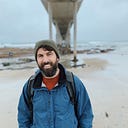Podcast Recommendation Round-Up!
Blessed with a new VO job, I’ve been commuting into Hollywood the past couple of weeks. For someone who’s created two podcasts and guested on perhaps a dozen others, I don’t actually get a chance to listen to them, so I’ve been catching up on shows that I’ve been recommended over the past year by graphic designer and artist, Christopher Miles.
THIRD EYE DROPS: Writing Reality Into Existence with James McRae
In a wide-ranging discussion of creativity, imagination and consciousness between writers Michael Phillip and James McRae, I was particularly inspired by their ideas around the very concept of knowledge: that we are all born with access to the source of knowledge, and our lives are spent unlocking it, simply remembering something that was already there.
EMBODIMENT MATTERS: On Mycelium, Compost and Animate Sensibilities with Sophie Strand
I’m not sure I’ve heard a more inspiring and intelligent speaker than Sophie Strand. A survivor of sexual trauma who lives with a disability, she comes at every single concept with a different vantage point than I do, overflowing with wisdom. It’s almost as if she speaks only in hyper-researched personal essays — and in a way, that’s true, because she so knows herself. Hosts Carl Rabke and Erin Geesaman Rabke are obviously gifted podcasters/humans, but I got the sense that even they were in awe (drink every time they say “Beautiful.”)
If you’ve been wondering after the masculine, the feminine, mushrooms, ableism, Big Tech and climate change, Sophie Strand scatters seeds into your mind begging to be watered, or indeed, composts some seeds you once had but had long forgotten.
TEN LAWS WITH EAST FOREST: Creative Bliss with Tiffany Shlain
In 2020 after watching Social Dilemma, I wanted to give up all social media forever. Instead, I doubled down on it in an effort to expand my network, reconnect with people and utilize it as an outlet for my work and surely take over the world. Lately, I’ve been questioning how much time and effort I put into it (and what I get out of it), and have taken some time off to reassess. I don’t have conclusions yet, but this podcast hit me in the right moment because it reminded me of many routines and desires that I had abandoned, like journaling every morning outside without my phone. Learning that Tiffany and her family spend one day a week without screens every Friday inspired Lili and I to make Wednesday a tech-free evening, with aims at continued experimentation and expansion.
FILTER STORIES: A History of Coffee
The history of coffee as we know it is the history of the modern world. As such, it’s enormously depressing. It is a tale that starts in Ethiopia, lands in Yemen, then spreads across the globe to the Caribbean, Central America and Vietnam, featuring Mankind’s greatest hits: colonialism, slavery, industrialization, war and capitalism.
This oh-so-accessible six-part history of a psychoactive bean from James Harper and Jonathan Morris (Coffee: A Global History) encapsulates all of the biggest events of the past 500 years, from the Civil War to the invention of the TV. Coffee and the commodities that we desire, need, are inextricable from world events.
The notion that coffee should be cheap and affordable is an ideal that far precedes the American Dream, but has since taken root there. In the 1700s when the entire world’s supply of coffee came from Yemen, it cost $13 per pound. Today, coffee costs $1.76 per pound. Perhaps that seems like a victory. But that victory comes with a heavy cost paid by those exploited to accomplish the feat: farmers and the environment.
LIFE EXAMINED: Why Good Listening Matters…
After a weekend marked with a bit too much conflict with the spouse, I returned to this podcast that Chris Miles had first shared with me to give it a second listen. We as a society expend a lot of oxygen TALKING and teaching how to speak, but we don’t teach how to listen. And hey, what’s the root cause of conflict? Not listening.
And why do we find ourselves arguing with the people we love the most?one might hypothesize that the more you know someone, the better you communicate, but it’s often the opposite. Enter: the closeness-communication bias. The more I know someone, the more I can shortcut — I know where this is going, I’ve been here before, I know how this person talks, etc.
Listening involves a great deal, but my favorite definition: listening is being willing to change your mind. Host Jonathan Bastian speaks with two listening experts and uncovers the four villains to good listening:
- the dramatic listener [the “Yeah, well, what about MY STORY” person]
- the interrupting listener [the obsessed with time and efficiency person who guesses what the speaker is going to say next]
- the lost listener [the distracted person — phone, shiny objects, their own mind, etc.]
- the shrewd listener [the person who thinks they’re ahead of the other person and rushes to fixing the problem]
- (I tend to fall under #2 and #4.)
If anyone out there is listening to this, I’d add this, or any of these, to your list o’ shows to stick in your ears.
